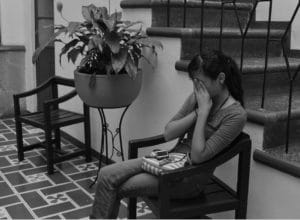What would you do if you found out your normally good teen was engaging in risky behavior? Maybe you’ve been ignoring signs of substance abuse.
 Making excuses for their erratic mood swings. Suddenly they are becoming withdrawn, failing in school and unrecognizable — but you figure, it’s a typical teenager, or is it?
Making excuses for their erratic mood swings. Suddenly they are becoming withdrawn, failing in school and unrecognizable — but you figure, it’s a typical teenager, or is it?
In these times of uncertainty, are we caught questioning our parenting skills?
From the moment a child is born many of us are filled with unexpected overwhelming feelings. An unconditional love that we only heard about from friends and family, but never imagined until we held our own infant.
We’re prepared for those terrible two’s, which are not so horrible in the scheme of life. We’re possibly a bit tired running after a toddler, however the rewards of watching them go off to pre-school then kindergarten are so exhilarating. Proud moments.
We start the sports, maybe dance and in my situation, gymnastics with my daughter (soccer with my son). Never a dull moment. Many parents soon find out what their mom and dad went through being a taxi-parent.
Yes, this is bliss — raising our children (capturing the memories like our parents did and quickly realizing it’s gone before we know it).
Then the tween and teenage years begin.
The child we used to know
We raise our children with a foundation to be good and hopefully, respectable people. Many families schedule meal times together at least a few times a week, some are dedicated to their religious beliefs and have somewhat of a stable home environment. It’s more common today to have a single parent household, like mine, but I don’t feel that’s a handicap. It’s a way of parenting that only requires adjustments compared a two-parent home.
It doesn’t matter the shape or size of your family, sadly it won’t prevent good teenagers from landing in hot water.
What to do you do when your angel that you raised from birth (or possibly adopted at birth) is suddenly someone you no longer recognize? The child you used to bounce on your knee or cheer on at baseball practice or clap for at dance recitals? The son or daughter that used to be part of the family — part of your life and most importantly used to be happy.
 Good teens, bad choices
Good teens, bad choices
You’re suddenly faced with a defiant, angry and rebellious youth. You suspect they are experimenting with drugs, something they swore they would never do — and you had so many discussions about this. They drop out of their favorite activities, they’ve always been a good student however now barely passing and you realize their peer group is changing.
What do you do when you feel like you’re being held hostage in your own home? Locking your own bedroom door – checking your medicine and liquor cabinets and walking on eggshells with how you communicate with your teen for fear they may explode with you?
Since 2001 I’ve helped parents of at-risk teens who are facing one of their biggest fears – they failed as a parent.
The majority of parents that contact me have already exhausted all their local resources such as therapy, out-patient and sometimes even short-term in patient. In some cases they have even sent their teen to live with a relative in hopes that it would make the difference. It doesn’t.
What do you do when you’ve reached your wit’s end?
Here are a few comments parents have made to me over the years. Does any of it sound familiar to you? The names have been changed for privacy:
My 17 year-old son who has a bad attitude about school, even though he is smart, is hanging out with the wrong friends, has been caught drinking and smoking pot with friends, doesn’t play sports anymore. – Debbie, Bradenton, FL
My daughter is 15. Defiant and starting using drugs. She will not listen, she sneaks out at night and has gotten two curfew tickets. – Kelly, Dallas TX
My 16 yr old son is very bright and articulate. He does drink, smoke pot and take mushrooms, has a violent reaction to being asked to help do anything around the house, has a superiority complex and feels he knows more than anyone. -David, Seattle WA
Chelsea was a good student until sophomore year. She was bullied by a group of girls and beat up and then neglected from her group of friends and has steadily declined. Quit sports/poor grades and now as freshman in college, I believe she is doing drugs and admitted to high alcohol consumption. -Terri, Peoria IL
Trevor 16. Since last summer, he’s been smoking pot but denies current usage. He’s intellectually bright and musically gifted, but grades in HS are down the drain–3rd quarter: 2 F’s and 2 D’s in his academic subjects. -Andrew, Greenwich CT
Mark 15. We’re tired of being held hostage in our home–can’t leave him alone, afraid to say anything that might cause him to “snap” and go ballistic. – Linda, Richmond VA
Jeffrey was a victim of bullying for several months until he had enough and got into a fight at school and got suspended. He pretty much “beat the other kid up” for lack of a better phrase. Lisa, St. Louis MO
14 year old daughter. I feel like a hostage most of the time and forced to emerge through a mine field never knowing when I am going to be blown up with her mood swings. I am frightened for her and for us. – Leann, Laguna Niguel CA
My daughter is 13 years old. She’s in such a rage. The heart that use to be in her chest is now just a black empty hole. She doesn’t care who she hurts both mentally and physically. Samantha, Westchester NY
16 yr old son. We need something that he can’t just walk out of. My Wife and I are extremely stressed and it is getting worse. We feel like hostages in our own home. That is not healthy. -Bruce, Denver CO
And then there was me
My kids grew up in Broward County, only minutes from Parkland in Weston, Florida where you would never imagine the unthinkable could occur — until it does.
Living in areas like Parkland or Weston may seem like living in a bubble. What many don’t realize is what goes on behind these gated communities and inside some of these big homes is the same as what is going on everywhere. Parents are looking for answers as to how to raise difficult teens.
 Many remain silent because of judgment they receive from others. Maybe instead of pointing fingers or shaming each other we should start talking and helping our neighbor when we realize they have a teen in trouble.
Many remain silent because of judgment they receive from others. Maybe instead of pointing fingers or shaming each other we should start talking and helping our neighbor when we realize they have a teen in trouble.
It’s easy to sit back and say this could never happen to you, especially if you never had a child, or your child is still young — however teen-hood has a way of playing tricks on your predictable life. Although many have had the typical ride of a bumpy teenager – some of us had to take the hard-way around.
It’s okay, we paved the road for you to learn from.
I had a good teen – she was/is my everything. She made some really bad choices. I had to make the leap to outside help after exhausting all my local resources (and her short stay at grandma’s).
Making the decision to send your child to a residential therapy is not easy. You don’t give birth to your children with the expectation that you will be sending them away before their college years. You feel, as a parent, like a failure.
I made a lot of mistakes that I hope parents now are learning from. With the conversation rising on mental health, don’t be afraid to advocate for your teen if they need the extra step that mine did.
By Sue Scheff, Founder of Parents Universal Resource Experts and author of Wit’s End: A Mother and Daughter’s True Story (HCI, 2008) and Shame Nation: The Global Epidemic of Online Hate (Sourcebooks, Oct 2017).
###
If you are struggling with your teenager’s behavior and you have exhausted your local resources, learn more about how residential treatment can help your troubled teen through emotional growth. Contact us today for a free consultation.








